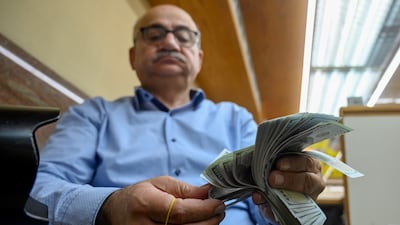Inflation in Lebanon surged to 171.2 per cent in 2022, the highest in nearly four decades, as the country continues to grabble with its worst economic crisis, according to official data.
Hyperinflation continued for the 30th consecutive month, rising annually to about 122 per cent in December from the same month a year earlier, led by triple digit increases in communication, food, water and energy costs, the Central Administration of Statistics' Consumer Price Index showed. The CPI increased about 6.73 per cent from November 2022.
Inflation in the country remains far from a peak of 741 per cent that was hit towards the end of 1987, during Lebanon's last civil war from 1975 to 1990. The country was expected to post the second-highest inflation rate in the world last year, behind Sudan, which was forecast to see its CPI hit about 180 per cent, according to Fitch Solutions.
Inflation in Sudan reached about 383 per cent in 2021, according to the World Bank, but started to decline last year as it rolled out an economic reform programme and plans to unify various national currency rates and the lifting of subsidies on basic consumer commodities.
Lebanon's crisis has been described by the World Bank as one of the worst in modern history, leading to a surge in unemployment, more than half the population sliding below the national poverty line and waves of citizens leaving the country.
Despite the crisis, the country's political elite have yet to enforce critical structural and financial reforms required to unlock $3 billion of assistance from the International Monetary Fund. Securing the IMF funds would also pave the way for an additional $11 billion of assistance that has been pledged by international donors at a Paris conference in 2018.
Reforms hinge on the formation of a new government, the election of a president and consensus among the country's political elite.
Politicians are deadlocked over the formation of a new cabinet eight months after parliamentary elections were held and after the six-year term of former president Michel Aoun expired at the end of October.
In a recent research note Goldman Sachs said the cost of the ongoing presidential vacuum on the Lebanese economy is “likely to delay already lagging reform efforts and progress on the International Monetary Fund's prior actions”.
Political impasses in Lebanon have led to political vacuums in the past, which stalled its economic progress and led its public debt to balloon.
Lebanon was without a president for two and a half years until Mr Aoun's election by the 128-seat parliament in 2016. His predecessor, Michel Suleiman, was elected in 2008 after the position had been vacant for 18 months.
Lebanon's economy collapsed after it defaulted on about $31 billion of eurobonds in March 2020, with its currency losing more than 90 per cent against the dollar on the black market. With the Lebanese pound trading as high as 50,000 to the US dollar in the parallel market, the peg of 1,507 to the greenback in place since 1997, has been effectively obsolete.
Foreign exchange inflows to the country that traditionally helped the government finance its deficits have dried up and tourist spending in the country has plunged.
Tourism spending declined 19 per cent in 2022 compared to a 14 per cent fall the previous year according to Global Blue, the value added tax refund operator. Occupancy rates at Beirut hotels was 49.6 per cent in the first 11 months of last year, compared with 42.5 per cent in the same period in 2021, according to EY's benchmark survey.
According to the latest CPI reading, the price of miscellaneous goods and services in December increased nearly five-fold, while the cost of water, electricity, gas and other fuels nearly tripled.
Communication costs increased more than six-fold while education and transport prices soared more than three times each.
Rates at restaurants and hotels and the prices of food and non-alcoholic beverages tripled.
The World Bank projects that Lebanon's real gross domestic product will contract 5.4 per cent in 2022, due to the “political paralysis” lack of action to put in place an economic recovery strategy.
The economy shrank about 58 per cent between 2019 and 2021 — the largest contraction among 193 countries, the Washington-based lender said in a report in January 2022.


